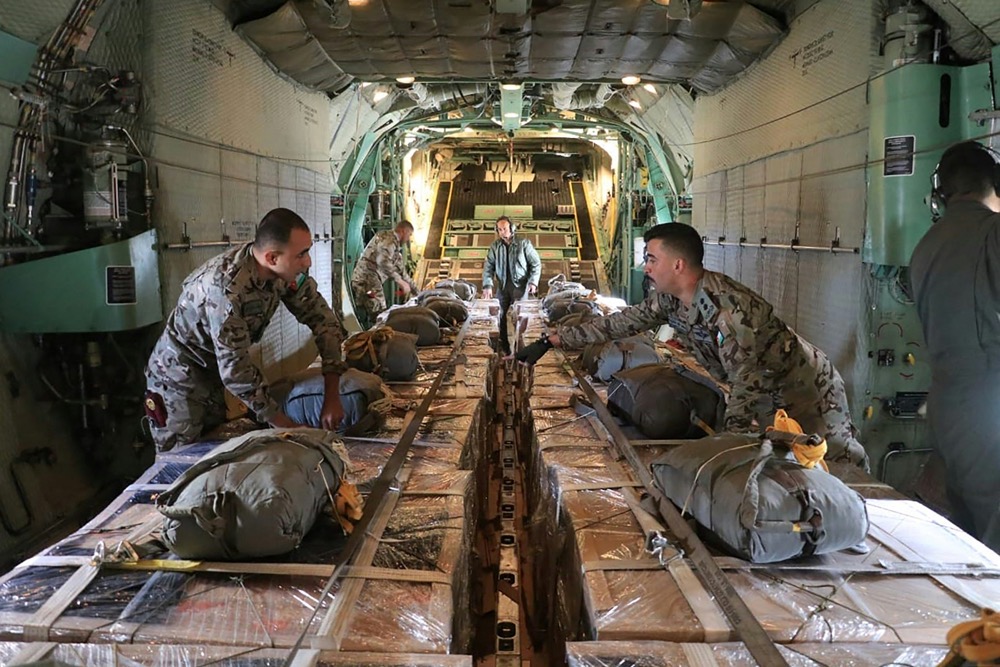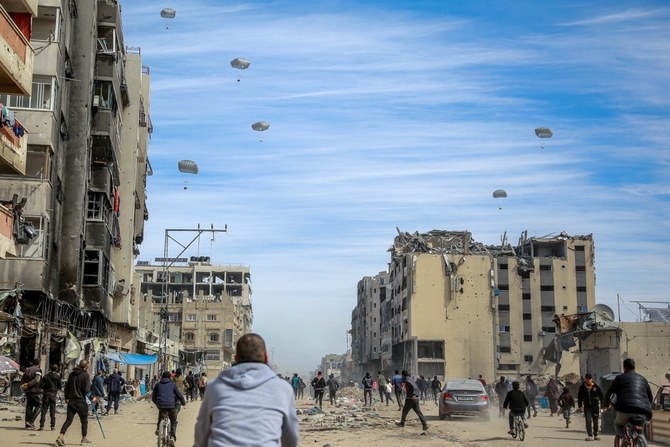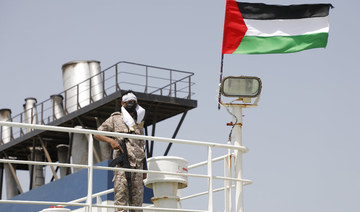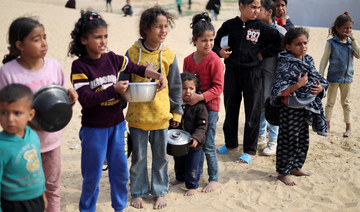LONDON: The US and its Arab allies appear to have finally circumvented the biggest obstructions in the path of food-aid flow to the neediest residents of the Gaza Strip. But averting a humanitarian disaster is still a work in progress.
With Israel proving unable or unwilling to facilitate the entry of aid by road to the beleaguered enclave, the US has begun efforts to bring relief to the millions of Palestinians on the brink of starvation.
Gaza has endured months of bombardment and effective siege since Israel launched an air-and-ground invasion in retaliation for the deadly Hamas-led attack of Oct. 7. According to Gaza’s Hamas-run Ministry of Health, some 30,500 Palestinians have been killed, 70,500 injured and 7,000 have gone missing since the violence began.
News that the US would begin airdrops of food and other supplies over Gaza came on the very day 100 Palestinians were killed by gunfire as they tried to reach a relief convoy. Israel denied that its forces were responsible for all the deaths, but the incident convinced the US and its Arab partners that they had to step in.

The WFP said that just six tons of aid were airdropped over Gaza last week, against 200 tons that sat in a 14-truck convoy waiting to be let through by Israel. (AFP)
President Joe Biden described the loss of life as “heart-breaking,” adding that the desperation of innocent people caught up in the war was starkly portrayed by the incident involving the relief convoy.
Biden said: “You saw the response when they tried to get aid in. And we need to do more, and the US will do more. In the coming days, we are going to join with our friends in Jordan and others in providing airdrops of additional food and supplies.”
Several days after this, the US added to its airdrop strategy a proposal to build a temporary dock on the northern Gaza coast to ferry provisions in from Cyprus by sea — an Israeli-approved humanitarian maritime corridor connecting the territory with the Mediterranean country.
That announcement, part of Biden’s final State of the Union address before the November elections, saw the US president promise that the pier, to be constructed by the US military, would allow Gaza to “receive large ships carrying food, water, medicine and temporary shelters.”

A military plane drops humanitarian aid over northern Gaza. (AFP)
Promising “no US boots on the ground,” Biden said that the pier “would enable a massive increase in the amount of humanitarian assistance getting into Gaza every day.”
While the promises have been clear, the details surrounding them have been opaque, with no information given on how much aid the US and its allies intend to airdrop over the Palestinian territory.
Indeed, the pledge to construct a pier has raised a number of important questions. Number one is how the aid would be distributed, given the US pledge that none of its troops would set foot on Gazan soil.
Gershon Baskin, Middle East director for the International Communities Organization, says the need for a partner on the ground could present its own future challenges, particularly with Israel representing the only viable option.
“I think with the vacuum of governance, the Israeli government has a responsibility to take this on and to protect the aid,” he told Arab News.
“If it does not want relief materials to be cornered by Hamas, then the Israeli government needs to be doing the protecting. And this might all happen, but that, in turn, brings the danger of creating an Israeli military government in Gaza. This is not something you want long term.”

Seven countries are involved in the operation to airdrop aid to the people in Gaza. (AFP)
Biden’s SOTU address suggested that he expected Israeli authorities to take on the security role, especially when he said the country “must also do its part.”
He added: “To the leadership of Israel, I say, humanitarian assistance cannot be a secondary consideration or a bargaining chip. Protecting and saving innocent lives has to be a priority.”
Media reports on Monday said that Israel was considering arming some Palestinian individuals or clans in Gaza to provide security protection for aid convoys into the enclave as part of wider planning for the supply of humanitarian relief after the fighting ends.
INNUMBERS
7 — Countries taking part in Gaza food airdrop operations.
2.2m — People in crisis or worse levels of acute food insecurity in Gaza.
1.4m — People reached since the start of the current crisis.
$760m — Money needed for WFP operations until end of 2024.
Source: WFP
Soon afterward, a Hamas-linked website warned Palestinian individuals or groups against cooperating with Israel to provide security for aid convoys.
A senior US official said that the Biden plan for a US-built pier could become operational with or without Israel’s cooperation.

According to Gaza’s Hamas-run Ministry of Health, some 30,500 Palestinians have been killed, 70,500 injured and 7,000 have gone missing since the violence began. (AFP)
“The president directed that we look at all options, that we don’t wait for the Israelis and that we pursue every channel possible to get assistance into Gaza,” the official told Arab News.
For weeks, Ahmed Fouad Alkhatib, an American commentator on Gaza affairs brought up in Gaza City, had advocated via X for air dropping aid into the enclave, tagging everyone from President Biden to World Food Programme Executive Director Cindy McCain.
In a post on March 2, Alkhatib, who calls himself “a pragmatic realist,” wrote: “Stop Dismissing Gaza Food Airdrops! When I first began putting together talking points and ideas for a big push to conduct food airdrops over Gaza in late December of 2023, I reached out to many pro-Palestine activists, advocates and experts in the humanitarian field.
He added: “Airdrops are typically considered a method of last resort due to their associated costs and general inefficiency from planes’ limited cargo delivery capacity compared to ships or trucks.
“But over time, and as I continued pushing, writing and engaging multiple parties and nations, many opened up to the idea of dispersed large-scale airdrops over Gaza, particularly in the isolated and famished north. This led to the large airdrops by Jordan, Egypt and the UAE, paving the way for the US to embrace this option.”
Sources within the humanitarian aid sector say that in the claimed absence of any alternative, the use of airdrops and the planned pier in Gaza will at least bring some relief.
However, they told Arab News that there are viable alternatives to air and sea aid.

US aircraft as part of a joint operation with Jordan and Egypt have been involved in delivering aid to Palestinians. (AFP)
One option popular with aid groups and NGOS seen as vital to staving off looming mass starvation is for the Israelis to remove all impediments to the flow of aid by trucks into Gaza.
While welcoming the Biden administration’s proposed sea corridor, Sigrid Kaag, the UN’s humanitarian, and reconstruction coordinator in Gaza, said that “air and sea is not a substitute for land — and nobody says otherwise.”
Similarly, a UN Relief and Works Agency for Palestine Refugees spokesperson said: “The most straightforward way of getting aid into the Gaza Strip is to use the existing (road) crossings.”
The UN and the World Food Programme have warned that “if nothing changes, a famine is imminent in northern Gaza.”
Ghina Bou Chacra, a spokesperson for Amnesty International, made it clear that what was needed was for Israel to lift its blockade on the entry of aid trucks.
“Israeli authorities have time and time again refused to take steps to ensure adequate access to humanitarian aid in Gaza,” Chacra told Arab News.

The amount of aid that can be dispensed by truck dwarfs what Palestinians in Gaza are seeing being dropped from the skies. (AFP)
“They must open all the access points and crossings to enable humanitarian organizations to transfer aid more rapidly into Gaza.
“They must do this on an even larger scale to areas in need and also ensure that humanitarian operations are protected from military attacks.”
Chacra added: “The roads are accessible and there are hundreds of trucks full of humanitarian aid at Gaza’s border (with Egypt) waiting for Israeli clearance.”
Without details on the movement of aid by sea, it is hard to compare, but when looking at air and road, the amount of aid that can be dispensed by truck dwarfs what Palestinians in Gaza are seeing being dropped from the skies.

Palestinians run toward food parcels airdropped onto a Gazan beach. (AFP)
The WFP said that just six tons of aid were airdropped over Gaza last week, against 200 tons that sat in a 14-truck convoy waiting to be let through by Israel.
Both Chacra and Jamie Shea, associate fellow of the International Security Programme at Chatham House, described the airdrops as a wasteful and inefficient means of dispersing aid.
Chacra further cautioned that the strategy was “potentially dangerous,” just hours before news broke that five people had been killed and 10 injured in Gaza after being hit by a pallet of aid.
The accident occurred close to the enclave’s Al-Shati coastal refugee camp on March 8, with reports claiming the pallet struck a group of men and children — who were awaiting its arrival on the ground — after the parachute attached to the aid payload failed to deploy.
“Humanitarian organizations have repeatedly warned that air drops should only ever be used as a last resort — when delivery by road or sea is impossible,” Chacra said.

News that the US would begin airdrops of food and other supplies over Gaza came on the very day 100 Palestinians were killed by gunfire as they tried to reach a relief convoy. (AFP)
According to Alkhatib, the Palestinian-American commentator, “large-scale airdrops over Gaza are requiring the use of hundreds of parachutes like nothing we’ve seen in recent years, presenting a host of challenges that are gradually being overcome and addressed.”
Shea suggested that in the absence of good alternatives, the US could try something like the 1948 Berlin airlift, when, with its European allies, Washington flew hundreds of planes loaded with aid to Tempelhof Airport to feed the West Berlin population and force the USSR to end its blockade of the city.
“Stalin did not shoot at US planes and the only casualties were from forced landings. It would require Western or Arab troops on the ground to unload and service aircraft, protect the airport from looters and store food prior to distribution,” Shea said.
Opinion
This section contains relevant reference points, placed in (Opinion field)
“Simply dropping off the food and supplies directly to the civilian population would undoubtedly lead to much of it ending up in the hands of the black market or Hamas.”
Echoing the view of many analysts, Shea said that with Biden under political pressure at home, the airdrops were certainly “a good way of showing to Democratic Party voters that the US cares about the humanitarian situation in Gaza and is putting pressure on the Israelis to seriously address this dire situation.”
Moreover, he said, as supplies start to arrive in Gaza via airdrops, the flow of aid — no matter how insufficient — is giving Israel a “safety valve.”

Over 2 million Palestinians are facing acute food insecurity in Gaza. (AFP)
He added: “In sharing the responsibility with other countries, Israel is suddenly not under pressure to open its border with Gaza in a way to allow significant humanitarian supplies through.”
Meanwhile, in a post on Monday on X, Alkhatib said: “Despite being inadequate on multiple levels, in 99 percent of the time, food that’s airdropped over Gaza gets immediately collected by civilians in desperate need; part of the reason why Hamas hates airdrops is because there are limited to no opportunities for the group to steal aid.”




























